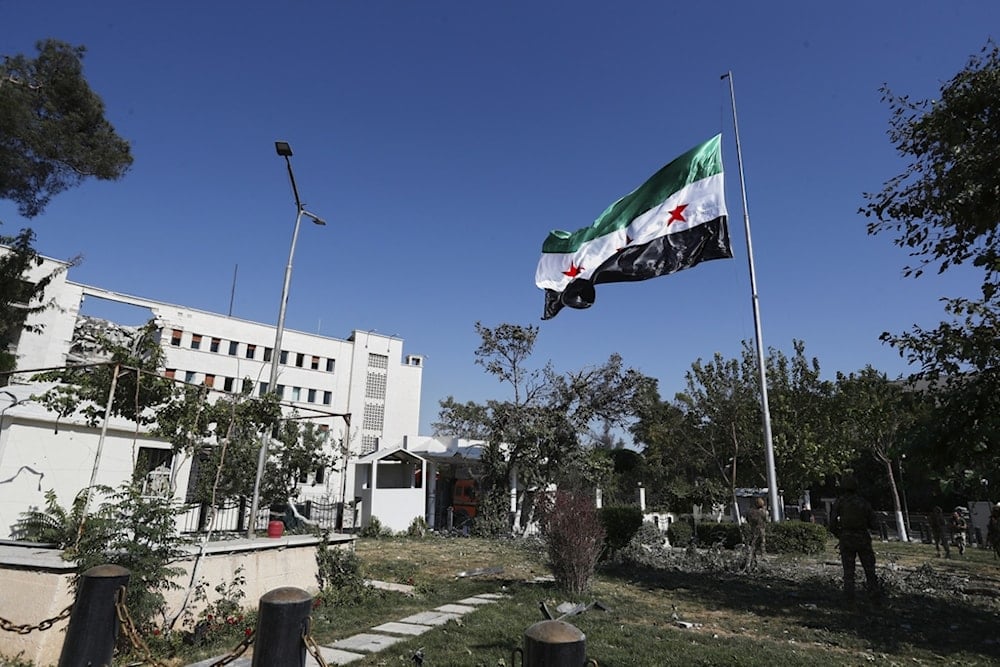US removes Syria envoys as Kurds face pressure to join Damascus
Reuters reports that several senior US diplomats working on Syria were suddenly dismissed as the Trump administration pushes to place the Kurdish SDF under the authority of interim President Ahmed al-Sharaa.
-

Syrian soldiers raise the Syrian national flag in front of the Syrian Defense Ministry building, which was heavily damaged by Israeli airstrikes last Wednesday, in Damascus, Syria, Saturday, July 19, 2025. (AP Photo/Omar Sanadiki)
Several of Washington's top diplomats working on Syria have been abruptly removed from their posts in recent days, Reuters reported Thursday, citing five people familiar with the matter. The shake-up comes amid a Trump administration effort to bring the Kurdish-led Syrian Democratic Forces (SDF) under the authority of interim President Ahmed al-Sharaa in Damascus.
The diplomats were part of the Syria Regional Platform (SRP), the US' remote mission to Syria based in Istanbul, which has served as Washington's primary hub for Syria policy since the US embassy in Damascus was shuttered in 2012. All of them reported directly to Tom Barrack, a longtime confidant of Donald Trump who was appointed as special envoy for Syria in May and also serves as US ambassador to Turkey.
Barrack has spearheaded a shift in US strategy, backing a unified Syrian state under Sharaa, who rose to power in a lightning offensive late last year. One US diplomatic source told Reuters that "a handful" of SRP staff were informed their tours were ending as part of a reorganization, noting the decision was not linked to policy differences.
Yet other officials described the moves as sudden and involuntary. The State Department declined to comment on personnel matters but stated that "core staff working on issues pertaining to Syria continue to operate from multiple locations."
SDF integration at the center of dispute
At the heart of the tension is Washington's pressure on the SDF to implement a March deal that would bring their territory back under Damascus' control and integrate their fighters into the Syrian armed forces. A Western diplomat suggested the dismissals were partly due to "a divergence" between staffers and Barrack on how hard to push the Kurds into the arrangement.
The SDF, which partnered with the US during Bashar al-Assad's rule, has resisted centralization. Kurdish leaders fear that full military integration without constitutional guarantees would erase the autonomy they carved out during the war.
Skirmishes continue in the northeast between SDF units, Syrian forces, and Turkish-backed groups, reinforcing the Kurds' calls for a decentralized post-war order. Control of oil fields, border crossings, and local administrations also remains unresolved, complicating the unification push.
Barrack's regional role
Despite these challenges, Barrack has pressed forward, arguing that consolidating Syria's fractured landscape under one government is key to stabilizing the region. He was in Damascus this week overseeing an agreement with the Druze minority in the south, which he said on X would secure "equal rights and shared obligations for all."
Analysts say Washington sees benefits in facilitating SDF-Damascus integration, namely calming tensions with NATO ally Turkey, and preventing Russia and Iran from filling security vacuums. But for many Kurds, the policy shift feels like another US betrayal, prioritizing strategic interests over their hard-won autonomy and exposing them to renewed central control.
Read more: Syria's al-Sharaa: Security deal with 'Israel' is a necessity

 3 Min Read
3 Min Read








